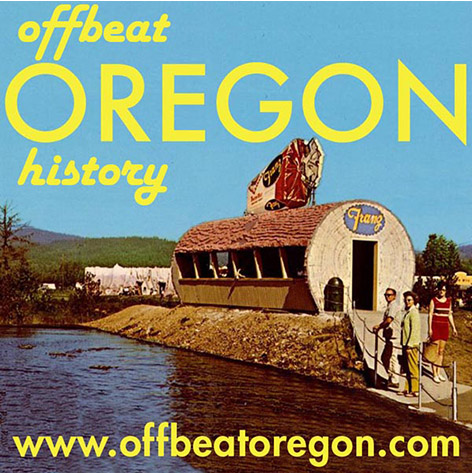PORTLAND, MULTNOMAH COUNTY; 1880s, 1890s, 1900s:
Why the legendary Virgil Earp is buried in P-town
Audio version: Download MP3 or use controls below:
|

Trouble they wanted, and trouble they got. On Oct. 26, 1881, Cowboy honchos Billy Clanton and Frank McLaury strutted into town with Colts on their hips, in violation of the town ordinance (which required all guns be checked in at a saloon or hotel immediately upon entry into city limits). Virgil deputized his brothers Wyatt and Morgan along with Wyatt’s buddy John “Doc” Holliday, and confronted Clanton and McLaury along with two other Cowboys in a vacant lot behind the OK Corral. “Boys, throw up your hands. I want your guns,” Virgil told them. Famously, they threw up their hands with iron in their fists, spitting lead at the lawmen, who were ready for them. In the ensuing firefight, three of the Cowboys were killed, the fourth ran for his life, and Virgil and Morgan both took serious but not life-threatening bullet hits. The Cowboy who ran from the fight pressed murder charges against the Earps and Holliday, but the charges were dismissed in court. So two months later, other members of the Cowboy gang tried to take vengeance. They hid out in an empty building and ambushed Virgil with shotguns as he walked out of his hotel, nearly killing him and leaving him with a permanently crippled left arm. Three months after that, someone shot Morgan through a pool-hall window, killing him.
Virgil settled down in Colton with Allie and tried to put down roots. He worked security for Wells Fargo & Co. — using a top-break revolver that he could reload one-handed — and opened a detective agency. Later he served as town constable, and became famous for his even temper and his ability to de-escalate potentially deadly situations. His favorite less-than-lethal law enforcement technique, when force had to be used, was “buffaloing” — that is, pistol-whipping — unruly suspects. After the “vendetta ride,” Wyatt joined Virgil, and the two of them started following mining strikes around California and Nevada, opening saloons and gambling houses, promoting boxing matches, and engaging in similar “sin industry” entrepreneurship. They went back to Prescott in the mid-1890s to work a silver mine, and Virgil was nearly killed in a mineshaft cave-in; the injuries he suffered would eventually team up with a bad case of pneumonia to kill him. But before they did, the shock of his life — and quite possibly the luckiest break he ever caught — came his way in the mail, with the name “Mrs. Levi Law” written above the return address.
The following year, encouraged by Allie, Virgil journeyed to Portland to reconnect with his family. He had an extremely pleasant visit with his former childhood bride, got to know his lost daughter, and met several darling grandchildren. He made an especially big impression on his grandson, George Law, who legendary pop historian Ralph Friedman actually tracked down and interviewed in 1976 when he was 90 years old. “A powerful big man,” Law told Friedman. “He wasn’t fat; he was broad-shouldered. His (left) arm hung like a rag.” Virgil was still fairly young in 1899 — still in his 50s. But he was worn out. He had lived a hard life; but as a law officer he had taken on those risks with the goal of creating the kind of country that his little family could thrive and be safe in. What he found in Portland had to have melted his crusty-old-gunfighter heart. He and Allie had never had children, whether by choice or by chance. Maybe he felt bad about that. But now it was as if a whole family had just materialized out of the clear blue sky to take him in, just as his clockwork was starting to wind down. All too soon, the visit was over, and Virgil headed back east to the latest mining-country boomtown that he and Wyatt were working: Goldfield, Nevada (this was just a year or two before legendary Portland shanghaier and all-around high-society bad guy Larry Sullivan came to Goldfield, by the way; the two likely never met.) When, in 1905, the old law dog finally succumbed to a stubborn case of pneumonia, grown-up Baby Nellie asked Allie if she could lay her almost-lost father to rest close by the family he always deserved but never knew he had. Allie, who seems to have been an absolute saint, readily agreed. So Virgil’s grandson-in-law, Alex Bertrand, promptly journeyed to Nevada and brought the body back to Portland, where he was laid to rest in River View Cemetery, in the family plot, close by the cold clay that once was the cream of old Oregon’s frontier elite.
After such a wild and restless life, it’s a real poetic justice that his bones are resting in a place where he’s never had to shoot at or “buffalo” anyone, close by the graves of his childhood wife and daughter, surrounded by family and friends. So, next time you’re up in Portland with a little time to stroll through Riverview Cemetery, you might consider stopping by Virgil’s gravesite to whisper, “Welcome home, old man; we’re glad you made it.” You know, just in case his restless spirit is still abroad. But I’m betting it’s not, and that it’s resting peacefully in the bosom of his once-lost family.
|




